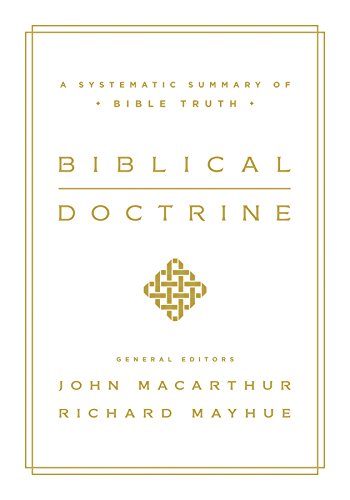John MacArthur and his long-time comrade Richard Mayhue have teamed up to write a new textbook of Bible doctrine. They have “waited until the evening hours” of their lives to undertake this massive project of 1008 pages in which they treat all the major topics of Systematic Theology (and Prolegomena) that is certain to prove of great value to many.
Distinctives
The authors and their theological distinctives are well known (dispensationalism, cessationism, and young earth creationism, for example), but some random observations about their work may be in order.
- The book is eminently accessible. MacArthur and Mayhue know how to make theology plain and present their arguments clearly. The level of theological interaction and treatment of opposing views render the book more useful for the college than the seminary classroom, and it is well-accessible for the Christian lay reader also.
- Also helpful are the many tables and summaries that appear throughout the book, such as the “king” titles given to Jesus, symbols for the Bible found in Scripture, several summaries of biblical evidence regarding God’s attributes, Christ in the Psalms, Messianic Prophecies in the Old Testament, characteristics of the Redeemer-Mediator in the book of Job, Jesus’ divine likeness, the names and titles of Jesus, names and titles of the Holy Spirit, the ministries of the Holy Spirit, contrasting claims regarding Spirit baptism, aspects of salvation, the fruit of the Spirit, the relationship of sin to other doctrines, encounters with demons in Acts, and many more. These summaries are regularly helpful, providing a considerable degree of information at a glance.
- The authors seek to keep a pastoral and doxological tone throughout, and they conclude each chapter with a prayer and a related hymn.
- Each chapter includes a bibliography of recommended reading from standard systematic theologies and individual works.
- With regard to the Trinity and the relation of the three Persons, many (because of the current debate) will be curious to know that MacArthur and Mayhue seem clearly to reject any notion of ontological hierarchicalism and subordinationism. Ironically, however, they recommend the book by Starke and Ware as one that is “most helpful” in the discussion.
- The discussion of the doctrine of man includes a helpful contemporary discussion of gender, sexuality, government, and culture.
- The agenda is primarily that of positive exposition, and there is relatively little significant interaction with major proponents of opposing viewpoints.
- Biblical Theology does not seem to play a significant role in the informing of the systematic categories.
- The soteriology that is presented is generally Reformed, affirming “the five points” but of course apart from the traditional Reformed context of a covenant of grace.
- Here I begin to note some relatively minor picks. Word etymologies play a surprisingly formative role at times, such as in the definition of the church as “the called out ones.”
- The treatment of Christ’s resurrection is otherwise strong but lacks a robust connection with soteriology, despite the mention of Richard Gaffin’s important work, The Centrality of the Resurrection. Overlooking this important gospel connection is disappointingly common in systematic theologies.
- The treatment of the doctrine of union with Christ is given virtually no role in (re)shaping the rather traditional ordo salutis – again, disappointingly typical of systematic theologies. And again, despite Gaffin.
- Attention is given to “definitive” sanctification, yet it is not related firmly to union with Christ, and the doctrine of sanctification as such shows virtually no awareness of the landmark work of David Peterson and is understood primarily in terms of the Christian’s progressive godliness.
Even allowing for these few minor picks and any distinctive theological difference the reader may have, most will find this new book is a solid summary of biblical teaching. The authors have served Christ faithfully for decades, and Biblical Doctrine is a fitting legacy of their work. It will doubtless prove profitable for many.
Fred Zaspel
